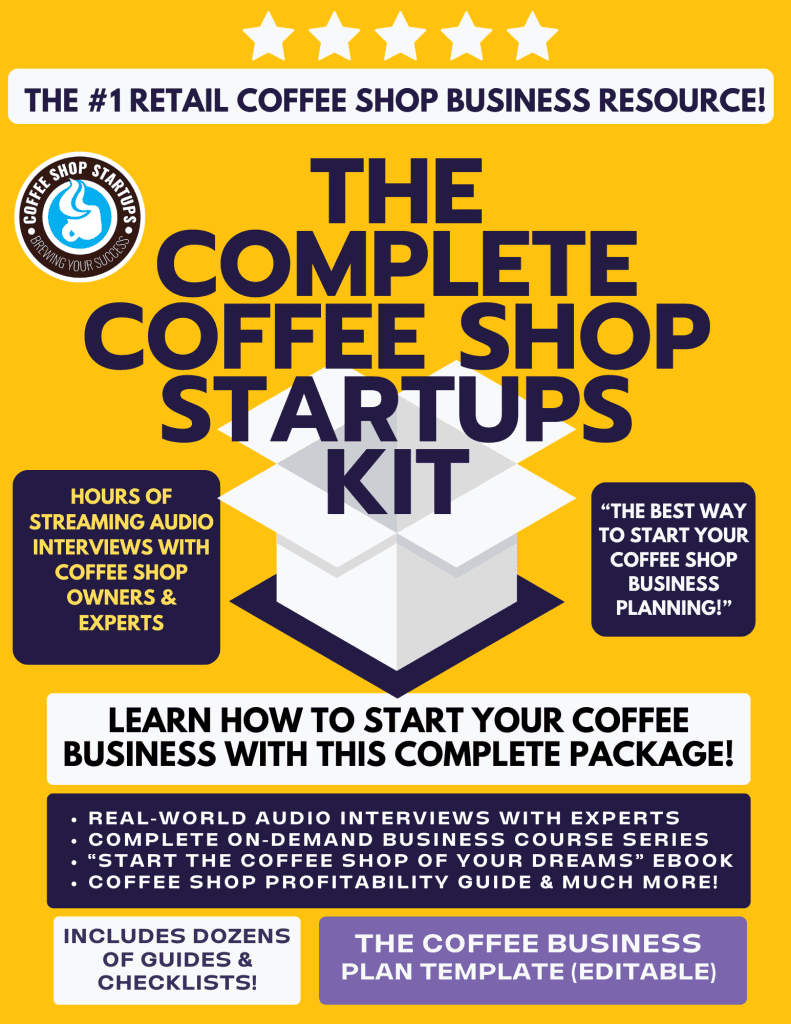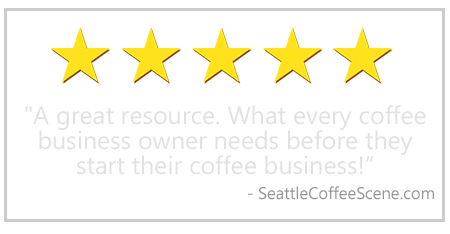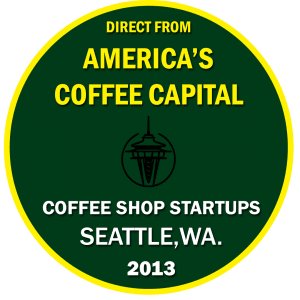How Much Does It Cost to Open a Coffee Shop?
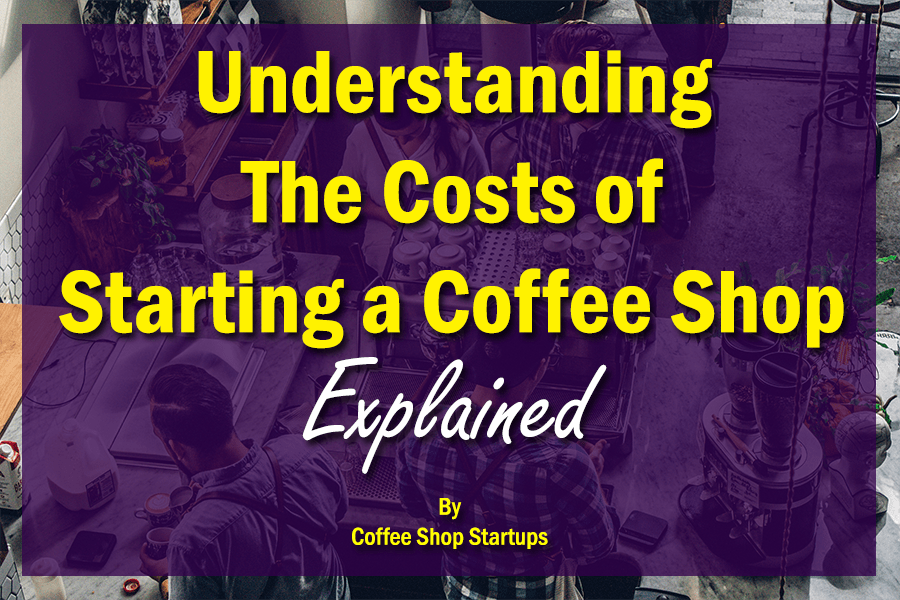
Your Coffee Shop Cost Breakdown
How Much Does It Cost to Open a Coffee Shop?
Starting a coffee shop is a great business option, but how much will it cost?
Your total cost to start a coffee shop ultimately depends on your business concept and menu, along with other important factors we’ll discuss in a minute.
It may help to consider your costs to be like a wedding you are planning for yourself and your future spouse. The ultimate cost of your wedding would be based on any number of factors, including your menu, your location, the time of year, how many people you plan to invite – or how “big” it will be.
Likewise, the ultimate cost of a coffee shop business rests entirely on your business concept, menu, equipment needs, and location.
Let's examine the potential costs for your coffee shop in great detail below.
Let's get started!
![]()
How Much Does It Cost to Open a Coffee Shop?
Your Coffee Shop Cost Factors
How much does a coffee shop cost to start?
The first answer starts with your type of coffee business. For example, do you want to open a drive-thru coffee stand, a cafe roastery, a wine and coffee shop, or a coffee truck?
Would you like a coffee shop that operates in the city center or perhaps in the suburbs? Are you buying an existing coffee business or starting a coffee shop from scratch?
All of these answers will impact your total coffee shop startup costs. So, let’s discuss those basic elements that make up most of the costs for your future coffee shop.
Your coffee shop startup costs depend on the following:
- Your concept
- Coffee shop menu
- Coffee equipment
- Physical location
- Build out & remodeling
- Labor costs
- Your legal & administrative costs
- Branding & marketing choices
- Furniture & fixtures
- Other additional costs based on your personal situation or location
These costs, taken together, can add up quickly. Nevertheless, you must tally up all of these costs and create a working coffee business budget. Throughout the process, it’s important to maintain honesty with yourself about the cost of each element and ensure that you include them within your budget.
The more you know, the better you will manage the costs of starting your coffee shop.
How Much Does a Coffee Shop Cost?
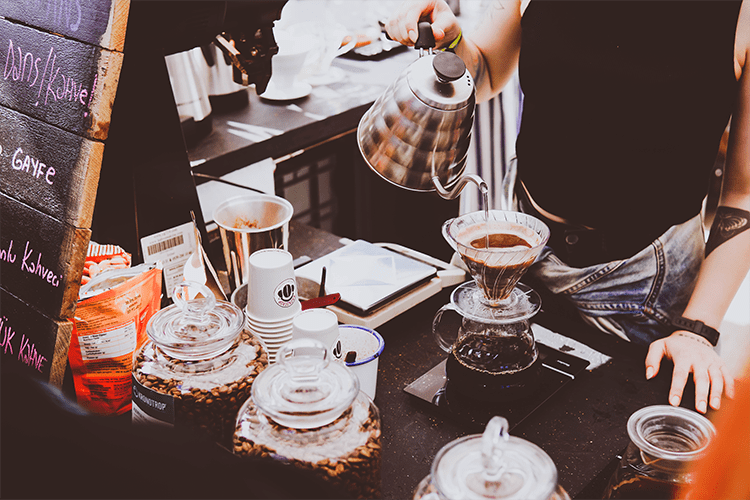
How much does it cost to start a coffee shop?
The Cost Estimates For Your Coffee Shop Concept
Each type of coffee business has a general price estimate. It is important to note that many costs aren’t always paid upfront – on day one. Rather, costs are often paid over a certain period of time.
This is important because you probably will not need 100% of the money upfront. Your coffee shop concept and situation determine how much money you need upfront.
Let’s take a look at the general concepts and their cost breakdown below:
Traditional Coffee Shop Business Cost Estimates*:
- Small coffee shop with seating: $45,000 to $200,000
- Large coffee shop with seating: $75,000 to $350,000
- Franchise coffee shop: $125,00 to $350,000
- Café & Bakery: $125,000 to $350,000
- Coffee Shop Bookstore: $80,000 to $250,00
Low-Cost Coffee Shop Business Cost Estimates*:
- A piggyback coffee business: $5,000 – $15,000
- Drive-thru coffee stand business: $25,00 – $90,000
- Espresso catering business: $5,000 – $15,000
- Mobile coffee business: $15,000 – $95,000
- Online coffee business: $400 – $10,000
*Updated on September 21, 2023.
As you can see, depending on each type of coffee business you intend to open, you will experience various cost estimates. I want to emphasize that these are just rough estimates to give you a general sense of some of the expected startup costs you may encounter. How you plan to develop your budget and your coffee shop funding mix is a critical step before moving forward.
Why categorize the above cost breakdowns into two general types?
- Traditional retail coffee shops
- Low-cost coffee businesses
The cost breakdown with these categories may help us better understand the money you expect to invest. The first category represents a “typical” coffee shop. A “typical” coffee shop is what an average person thinks a coffee shop is. The second category focuses on several low-cost coffee businesses. Some of these may be unorthodox or non-standard coffee businesses (as we have listed).
![]()
How much does it cost to start a coffee shop?
Types of Coffee Shop Startup Costs
You should be aware of several terms associated with costs when starting a business. We believe these terms are helpful to know as you get deeper into the reeds with figuring out your coffee shop budget and ultimately determining your total coffee shop costs.
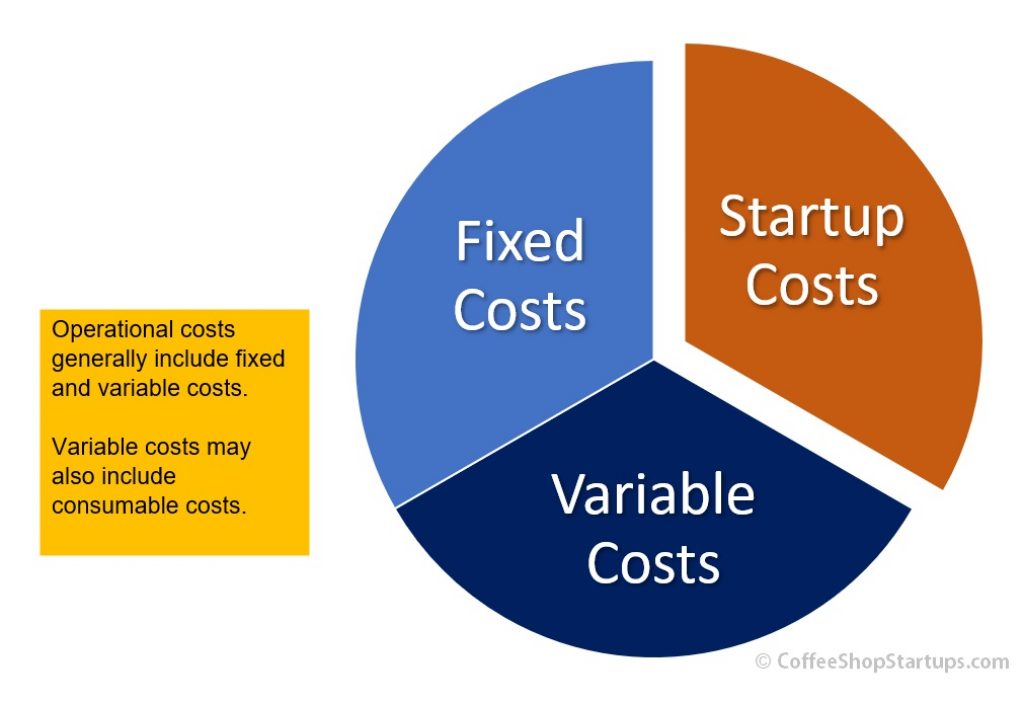
Download our Free Coffee Shop Cost Breakdown – PDF Insert
In order to calculate the cost of a coffee shop startup, we will list and define various coffee shop costs below:
Coffee Shop Startup Costs
These costs are solely associated with the money you need first to launch your coffee business. They often include the costs of branding, legal fees, administrative paperwork, security deposits, coffee equipment, building out your space, consultants, training, etc.
You may see these notated differently on your tax filings from your operational costs the following year that you opened your coffee shop. (You should consult a tax specialist for more information.)
Coffee Shop Operational Costs
These costs are required to keep your business running daily or month-to-month. They can be anything from the cost of your coffee beans, milk, payroll, utilities, and rent.
Your operational costs often include two general categories: fixed and variable.
Coffee Shop Fixed Costs
Fixed costs are costs that don’t typically change month to month. These costs can be your monthly rent, insurance premiums, security payments, a manager’s monthly salary, etc.
Your Coffee Shop Variable Costs
Variable costs fluctuate regularly depending on your sales volume, hours of operation, etc. These may include the number of coffee beans, cups, lids, barista labor hours, syrups, milk, sugar, napkins, etc.
Coffee Shop Consumable Costs
Consumable costs are simply those costs that are expended regularly because they are used up. For example, they could be anything from paper napkins, cups, lids, soap, disinfectants, bleach, towels, etc.
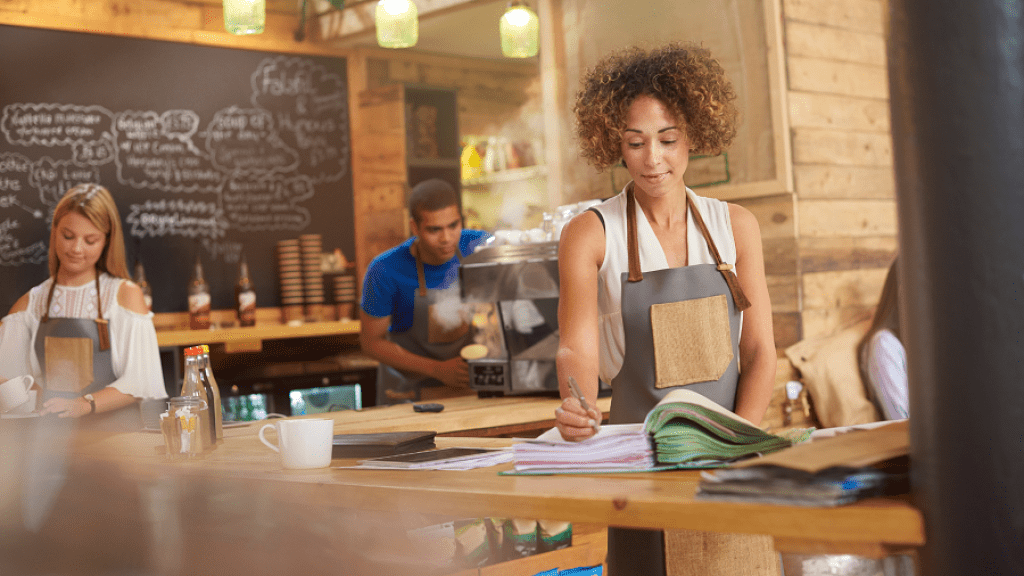
Calculate The Costs of Starting a Coffee Shop
The coffee shop costs listed above will be needed to calculate your cost of starting a coffee shop. Once these costs are defined for your coffee shop business, usually in a spreadsheet or budget document, we can add up the costs. From there, you can determine which costs you can eliminate or that you determine are absolutely necessary.
![]()
How much does it cost to open a coffee shop?
Your Coffee Shop Cost Analysis
Your coffee shop cost analysis is just a fancy way of laying out all your costs on the table. It is your “umbrella” term or “blanket” cost description of everything that needs to be accounted for. Your analysis will determine how much your coffee shop will ultimately cost.
Your cost analysis includes your initial startup costs, materials used for building out your shop, contract work, cafe design, layout services, permitting costs, etc. It would include your operational costs, too.
Your cost analysis will help you determine how much money you will have to pull from your personal savings, take out a bank loan, utilize personal investors, etc. Your operational total cost analysis will help you figure out your funding mix.
Coffee Shop Cost Breakdown
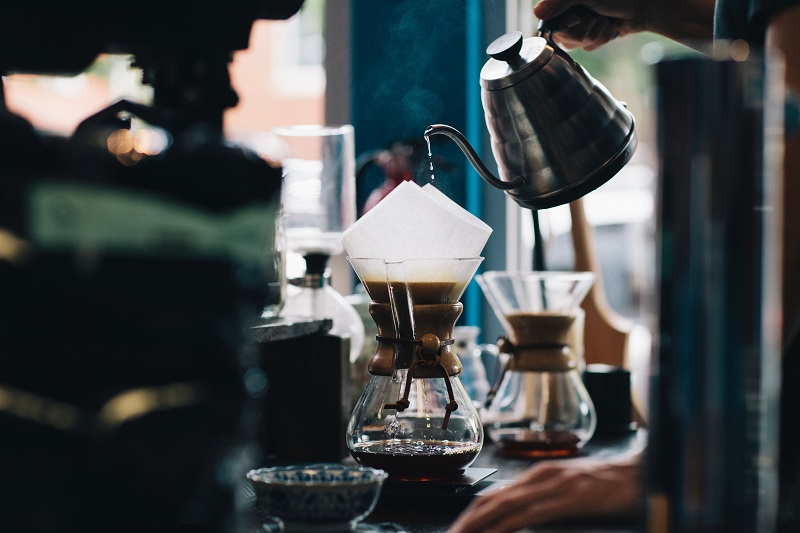
How much does it cost to start a coffee shop?
Calculating Your Coffee Shop Business Costs
Step 1 – Write a Coffee Shop Business Plan
By putting together a well-written business plan, you can determine – among other things – your financial projections. These will include your general overhead, coffee equipment costs, rental costs, payroll costs, and your break-even point and profitability projections.
By running these numbers, you can determine your return on your investment (ROI).
Additionally, a comprehensive coffee shop business plan will be important as you approach property managers and investors who want to understand your concept and see a detailed financial forecast for your proposed coffee business.
By understanding what you want and need, you’ll also be a better negotiator, reduce your costs, and save tons of time.
Your Coffee Shop Concept
Your business plan will articulate your coffee shop concept. Additionally, your concept determines what type of coffee business you intend to open. Since it serves as the base of your coffee business, it will be the gateway to determining your total cost estimates and financial forecasts.
Your concept should detail the overall experience you and your customers will have when engaging with your business.
While you’ll have plenty of options, you want to ensure your concept resonates with your target market within your chosen location.
A perfectly executed concept may not work well if it does not resonate with your community, so be sure to determine the best fit for customers in the location you plan to open.
Step 2 – Determine Your Coffee Shop Menu
It may not seem obvious initially, but your coffee shop menu plays quarterback to your entire coffee shop budget.
Without knowing your menu first, your most effective planning will grind to a halt.
For example, your coffee menu and prices affirm who your target customer will be. Therefore, in essence, your menu really determines your ideal location.
Additionally, your menu will determine what equipment you are going to purchase. Your equipment requires a certain amount of space, installation, and people to operate it.
This impacts your lease, contract work, and hiring baristas. Don’t forget that if you want to open a full-fledged café with a kitchen, you will be under greater scrutiny from the health department to get a permit.
Because of all this, it’s fair to say that what's on your coffee shop menu board is the center of your entire coffee budget.
Step 3 – Choosing Your Coffee Equipment
Your coffee equipment plays a big part in your upfront startup costs. If you finance or lease your coffee shop equipment, you’ll have to make monthly payments, including interest payments.
Coffee Shop Equipment Costs Include:
- Espresso Machine
- Grinders (one for decaf and one for regular espresso)
- Scales
- Metal Pitchers
- Scales
- Toaster Ovens
- Refrigerators
- Freezers
- Ice-Makers
- Coffee Brewers
- Display Cases
- Storage Racks
- Blenders
- Dish Washer
- Grease Trap
- Point-of-Sale System
- Power Generator (mobile coffee business)
Coffee Shop Consumable Costs
Consumable supplies may be categorized as equipment as well. These items are regularly used up.
These may include towels, soap, disinfectants, and bleach. They may also include things like boxes, bags, napkins, postage, etc. All of these can add up to increase your variable costs as time goes on. Being mindful of waste can lead to significant savings with your consumables.
As you ramp up your inventory initially and determine what works best for your coffee shop, you’ll probably spend a little more during a “trial-and-error” period. This is normal. The more experience you have, the less waste you’ll most likely experience.
Maintaining your inventory and budget management will help you make better decisions and save money. Your coffee shop POS system can come in handy in helping you manage your inventory.
Step 4 – Finding the Right Physical Location & Space
Real-estate costs will play a big role in how much your coffee shop will cost – with your upfront startup costs and operational costs.
Your location rental costs are determined by your square footage (or square meters in Europe or elsewhere).
The cost per square foot helps compare the cost differences between locations.
If you decide to lease your coffee shop space, you’ll be paying for a security deposit, monthly rent, and possibly other expenses as defined in terms of your lease. Other rental scenarios may include paying a certain percentage of your gross sales to the property manager monthly.
Some common expenses and rent payments are pest control, security service, trash, taxes, and building maintenance fees.
These costs should be tallied together to determine your overall rent-to-earnings ratio.
![]()
Calculating Your Coffee Shop Expenses
How much does it cost to start a coffee shop?
How much should your coffee shop location cost?
Real estate costs vary by city or region. In some parts of the country, you can expect to pay higher prices for your rent and associated expenses noted above compared with other parts of the country.
According to Zillow, the average percentage of your home rental cost should not exceed 30% of your income. However, this is a rule of thumb for your personal finances and should NOT be used as a benchmark for your coffee shop business.
Instead, look at the ratio of your annual rent costs to that of your annual earnings.
Estimated Revenue ÷ Annual Rent = Ratio
For example, if you pay $1500 in monthly rent, that translates to $18,000 per year. Let’s say that your estimated annual revenue is $120,000. From that information, we can calculate the ratio.
Let’s do that math:
Using the equation above, your revenue-to-rent ratio is:
$120,000 (revenue) ÷ $18,000 (annual rent) = .15 or 15%.
This ratio might be acceptable.
However, it may be better as a retail coffee shop if your ratio is around .10 or less.
Your earnings should be around $170,000 to $180,000 per year to get your revenue-to-rent ratio to a safer level. Your estimated revenue should be decisive in your location choices (and, thus, your overall cost estimates). You can't adequately plan without the other!
If you find a great location, but your revenue-to-rent ratio is, say, .30 or 30%, you will have a strong likelihood of getting in-over-your-head quickly. Again, you do not want to use the same ratio recommendations for your personal living expenses!
Regarding your retail coffee shop, we think your ratio should not exceed 12% of your gross sales.
![]()
How much does it cost to start a coffee shop?
Is your coffee shop lease worth the cost?
The less money you spend on rent, the more you will have to invest in your coffee shop growth (advertising, staff, paying back loans more quickly, and, of course, paying yourself!).
You’ll have to determine if the rent you will be paying is truly worth the cost. Is there something unique and special about the location that is worthy of you renting there? Again, you must incorporate your concept, customers, menu, and other qualitative factors that space provides.
Once you’ve signed your property lease, you’ll next have to consider the costs to design and construct an appropriate layout. Let’s talk about that next.
Your Coffee Shop Design & Layout
If you start a coffee shop from scratch in a new and cleared space, you may have various initial costs.
These costs may include paying an architect or a design firm or layout specialist to create a scalable mechanical drawing. This design would then be used by one or several contractors.
Hiring multiple contractors can blow a hole through your coffee budget, so you will want to plan before hiring anyone. You may consider saving money and doing as much of the work yourself.
Be mindful that some states, counties, and property managers require licensed contractors to do the specialized electrical installation and plumbing work. And in every state, you are required to be ADA compliant.
Step 5 – Budget for your legal & administrative costs
There are often nominal but important fees and costs associated with setting up your business.
These costs and requirements should not be overlooked. Make sure they get into your budget planning.
These costs may include:
- The cost of setting up your coffee shop LLC
- Paperwork that may require hiring a lawyer or legal service
- Applying for city and state licenses and permits
- Health department proposals and inspections
- Buildings department proposals and inspections
Step 6 – Budget for Your One-time Coffee Shop Startup Expenses
As part of your startup costs, you will have various one-time expenses. Not counting your equipment costs, these other one-time expenses are important to your business and expensive. Overlooking them might undercount your financial needs. Like other costs associated with starting your coffee shop, they can add up quickly.
These one-time coffee shop costs may include:
- Any security deposits
- Consulting fees
- Website development
- Security System
- Point-of-Sale (POS) System
- Furniture & fixtures
- Exterior signs
- Exterior lighting
- Indoor and exterior menu board
Step 7 – Budget for Hiring Staff
You can work it yourself if you own a small coffee kiosk or coffee cart. However, there may come a time when even your small coffee shop will need to hire staff or baristas.
Many times, you will have to hire multiple staff members.
The cost associated with staff can add up quickly. For example, hiring two or three baristas to work 30 hours a week.
That’s 90 hours @ your hourly rate.
Additionally, you may have to pay certain benefits mandated by the state, including workers comp insurance, taxes, and medical leave. Hiring staff can be expensive, which is another reason to be extra diligent with your hiring choices. Your barista hiring decisions will be a key factor in your coffee shop success. Keeping your baristas trained and engaged in your business will lead to higher customer satisfaction, higher revenue, and a better work environment.
Step 8 – Marketing and Promotion Costs
The marketing and promotion of your business may have one-time or ongoing costs. A variety of benchmarks are given for new retail businesses. Consider budgeting 10% of your net revenue to sustain marketing and promotional costs. This would especially be important for new coffee businesses.
These costs may include:
- Your website development
- Coffee shop grand opening
- Designing and printing business cards
- T-shirts
- Signs or posters
- You may decide to hire a social media consultant or graphic designer.
You’ll want to make sure to include each of these costs in your budget.
Step 9 – Ensure Cash-on-Hand to Cover Expenses Until Profitability
Like any other business, your coffee shop will probably not reach profitability overnight. And your business may take time to ramp up to its full potential.
Without cash, your business will grind to a halt pretty quickly. So, you will want to have a certain amount of cash on hand for various expenses.
This may include contract labor, barista payroll, inventory and supplies, utilities, etc.
Depending on your coffee shop concept, you will want enough cash on hand to sustain your business for at least six months' worth of expenses. Together with your existing sales and careful budgeting, this financial cushion will help you ensure stable growth until you reach profitability.
Bear in mind that a six-month cushion may not be enough. It depends on your concept, operational costs, and your level of sales.
If your expenses are $2000 a month, you will want to factor in another $12,000 of cash on hand in your budget.
Other Miscellaneous Coffee Shop Expenses:
Many costs have the keen ability to sneak up on you. They add up quickly or hit you just as you’re not suspecting it. As a new coffee shop owner, these costs can send you scrambling to find new money. Prepare for these additional coffee shop startup costs, and you'll be in a much better position.
These costs may include:
- Lump interest payments on loans
- Taxes
- Consultant fees
- Equipment maintenance fees
- Barista training
- Shipping costs
- Moving expenses
- Over existing debt
How Much Does It Cost to Open a Coffee Shop?
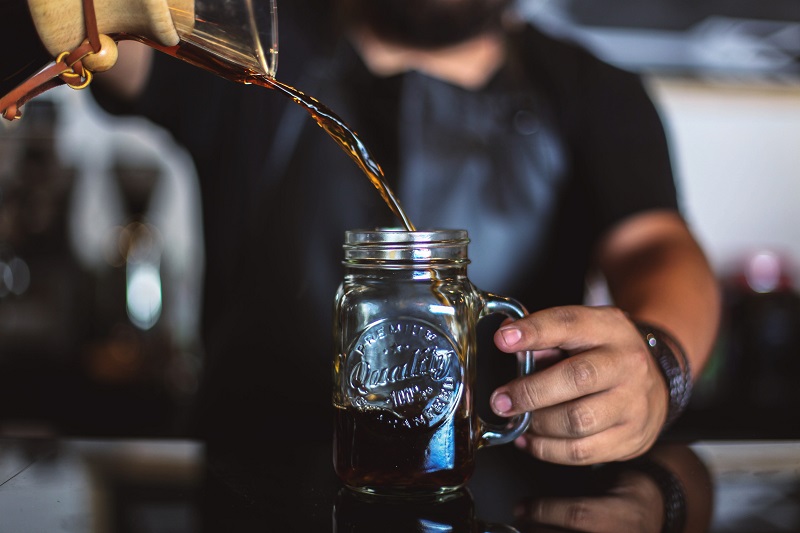
Coffee Shop Startup Costs
Moving from Costs to Profits
Now that we’ve talked about costs, let’s talk about profits!
Each cost mentioned so far is really an investment in your business. You are ultimately spending money to enjoy a return.
Whether you buy an espresso machine display case, hire a barista, or design a coffee sign – it’s all geared for the ability to make money.
Your ultimate goal is to create a profitable business. Just how profitable a coffee shop is entirely up to you.
What is a good profit margin?
If you are asking, “what is a good profit margin for my coffee shop?” – You’re asking the right question!
Certainly, profit margins vary from industry to industry, but there are generally accepted standards for profitability.
Typically, a 10% net profit margin is considered average or good. In comparison, a 20% profit margin is considered very good.
In many cases, anything under 5% may be considered poor margins. Of course, when you are just starting a coffee business, you may not reach profitability for the first year or two.
With profit margins, consider that margins differ:
- from industry to industry;
- between new businesses and older businesses.
How do you calculate the profit margin?
While not in the scope of this article, we’ll briefly mention some strategies to calculate your profit margins. For starters, you can determine your net income by determining your net sales and then subtracting your costs of goods sold (COGS).
Basically, take your income and subtract the costs. Then, you will divide that number by your net sales.
Net Sales – Cost of Goods Sold ÷ Net Sales
= Gross Profit Margin
For example:
Let’s say your net sales are $1,000 for the week. Your cost of goods sold (COGS) is $600. By plugging the numbers into the equation, you'll get this:
$1000 – $600 = $400/$1000 = .4 or 40% Gross Profit Margins
This is a very simplified look at costs, but hopefully, it will help introduce you to how you can look at your profitability. For another in-depth look at potential costs for your coffee shop, read our post, How to Determine the Cost of Selling 100 Coffees.
The Cost to Open a Coffee Shop:
Your Potential Coffee Shop Funding Mix
There are a variety of ways to obtain the money to start your coffee business. Many times, your money will come from different sources. We like to refer to these sources as your funding mix.
Here are some examples of funding sources:
1. Personal Savings
2. Credit Cards
3. Borrowing (institution or a personal loan)
4. Bringing in investors/partners
5. Crowdfunding
These are the general funding pools that you will need to draw money from. Before you borrow or bring in potential investors, you want to determine:
1. How much money do you need to open your coffee shop?
2. How much money you can obtain from each pool
3. Develop your financial forecasts to know when you reach your break-even point.
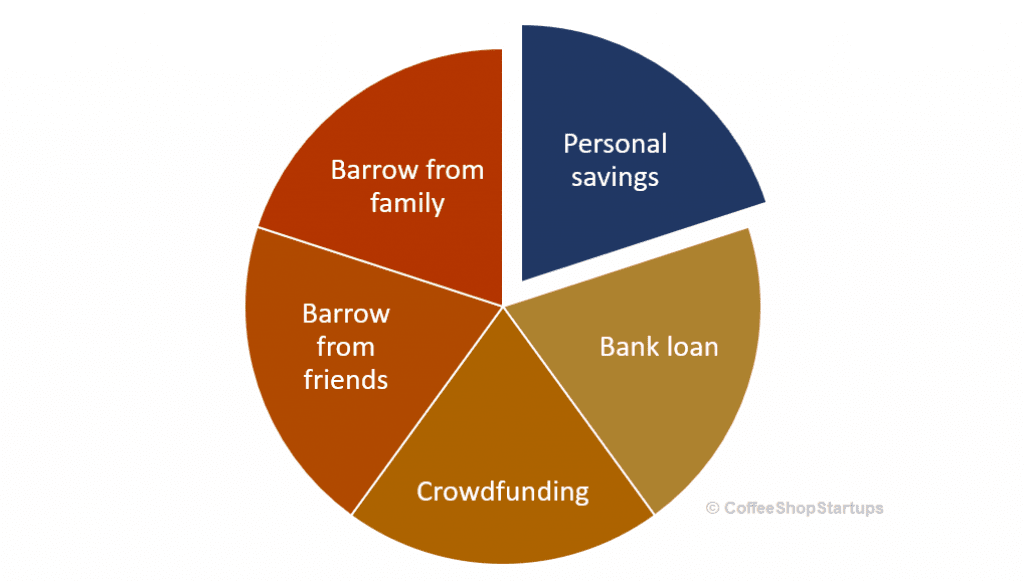
Let us take a look at the pros and cons of using various finance pools to cover the costs of opening a coffee shop. Consider the table below.
| Funding Type | Pros | Cons |
|---|---|---|
| Personal Savings | Funds without going into debt | Higher personal financial risk |
| Credit Cards | Immediate Financial Resources | Must payback debt with high interest rates |
| Borrowing (bank or a personal loan) | Cash Funding | Must payback with variable interest rates |
| Bringing in Investors/Partners | Cash Funding | Potential loss of company control (diluted decision making power) |
| Crowdfunding | Funds without interest | Some fees, You need funds to invest in a marketing campaign, You may have to pay enticements |
![]()
How much does it cost to open a coffee shop?
Related Coffee Shop Cost Questions:
What drives up the cost of coffee shops?
At every turn, your coffee shop costs could go up. It will be important for you to stay on top of your budget and push back on your costs ballooning in every area of your business.
Developing the details of your coffee shop concept before spending any real money will be a worthwhile investment.
With that said, a lack of planning can easily drive up your coffee shop's cost.
Whether you buy the wrong coffee equipment, rent a poor location, hire too many staff, develop a too expensive concept, or waste inventory, costs can easily rise.
Things that drive up the costs of a coffee shop:
- Lack of planning
- Unfavorable lease terms
- Over-reaching business concept
- Waste
Are there strategies to reduce the cost of starting my coffee shop?
Reducing your coffee shop costs at every point may just be one of the most important roles you’ll play in starting your coffee business.
The first important step is to develop your business plan thoroughly before you spend any real money.
Ask yourself, does your concept and coffee shop cost analysis seem to work together – or does it need adjusting? If so, it’s okay to make adjustments!
Will the concept (and your location, menu, etc.) lead you down a potentially expensive path? If you think you might be headed for spending more than you think you can afford, slam on the brakes.
When you develop your business plan and budget, take a look at things you might be able to do without. Do you really need an expensive 4-group espresso machine – or could you make things work with a 2-group machine?
Your estimated monthly rent will be a big factor in your total costs. What steps can you take to reduce your cost here? Does it make better sense to open up a drive-thru coffee stand or set up a mobile coffee business instead?
Training also reduces your operating costs. Training your baristas will have enormous benefits in delivering a better product, experiencing less turnover, and less waste.
There are several ways to reduce your costs. The key is to develop an outlook or attitude that stems from simplicity, organization, and dedication to reducing waste.
Further Reading: Is Starting a Coffee Shop Expensive?
Is a coffee shop business worth the costs?
A well-operated coffee shop with a steadily growing business can be well worth the costs.
If your business makes sales every day, it can grow your business into a profitable one. Consider your financial forecasts. You will want to monitor whether you can bring in your anticipated revenue. A small coffee shop makes $500 daily for six days a week in the United States. That would be $12,000 per month in revenue. If your costs are about 2/3 of your revenue, is it worth it? I would say so.
How much money can I make with a coffee shop?
The amount of money you can make at a coffee shop or coffee business can be significant. Your revenue can be a life-changer. But where there are significant financial rewards, there are also financial risks too. It’s fair to say that some years will be better than others.
The revenue and net profits your coffee shop brings in depend a lot on the volume of sales, customer base, your menu and related price points, and your cost. For more information on how much money you can expect to make with a coffee shop, read our post, How Much Money Do Coffee Shop Owners Make?
What are your coffee shop's monthly expenses?
When determining your coffee shop startup cost breakdown, there are two general pockets to consider: your startup and operational costs. Your coffee shop startup costs are your initial costs to launch your coffee business. These could be anything from your business setup costs to your logo, equipment, and build-out costs. As described above, operational costs are everything it takes to run your business.
For many, looking at operational costs broken down by month is helpful. Your monthly costs will likely be most of your operating costs but could also include some startup costs.
From personal budgeting, we are used to figuring out costs per month. We commonly use our monthly budget to assess our rent or mortgage payments, car payments, and cell phone bills. Therefore, it is fair to ask how much a coffee shop costs per month.
Hence, figuring out our monthly costs to run a coffee shop makes sense.
What coffee shop monthly expenses should I expect?
Every month, coffee shop owners can expect certain expenses. These vary depending on your ultimate concept. Yet, some expenses are generally the same from one coffee shop to the next. I will list common coffee shop monthly expenses below.
- Rent – your monthly lease cost
- Labor – Salary, hourly wages, and taxes.
- Insurance – General liability, commercial auto.
- Inventory – Coffee, wholesale food, milk, etc.
- Supplies – Cups, lids, napkins, spoons, etc.
- Security – You may need to pay a business association fee for security services.
- Utilities – These fluctuate, but they are billed out every month.
- Interest on loans – This may likely include principal payments.
Can you afford your own coffee shop at this time?
You still may be unsure if you can afford your coffee shop now. Money – and access to money – is the single biggest factor when deciding to invest in a coffee business.
You will have to assess your finances and determine if opening a coffee shop leaves you vulnerable. You may not want to jeopardize your well-being to start any business.
There are plenty of things that you can do today without spending any money on a coffee shop. Planning, learning, and exploring retail coffee come to mind.
If you are on a minimal budget, consider reading posts we’ve written, Low-Cost Coffee Shop Ideas, or How to Start a Coffee Shop on a Budget.
How Much Does a Coffee Shop Cost?
As you can see, many elements come together to develop your coffee shop budget – and ultimately determine your coffee shop costs. We will summarize those items to consider when determining your coffee shop costs with the list below:
- Write a coffee shop business plan.
- Determine your coffee shop menu.
- Choose your coffee shop equipment.
- Finding the right physical location and space.
- Budget for your legal and administrative costs.
- Budget for your one-time coffee shop startup expenses.
- Hiring staff allowances.
- Hold cash reserves to cover expenses.
- Be mindful of other miscellaneous expenses.
Are You Ready To Get Started?
Unlock Your Dream Coffee Shop Business with Our Exclusive Coffee Shop Startups Kit!
Ready to transform your passion for coffee into a thriving business? Look no further! Our Coffee Shop Startups Kit is your key to brewing success. Here's why you can't miss this opportunity:
![]() 35-Lecture Coffee Shop Business Course: Our kit provides a comprehensive A-to-Z lecture series that covers what you should know and how to plan your coffee business. No more guesswork – follow our proven roadmap for success.
35-Lecture Coffee Shop Business Course: Our kit provides a comprehensive A-to-Z lecture series that covers what you should know and how to plan your coffee business. No more guesswork – follow our proven roadmap for success.
![]() Comprehensive Coffee Shop Business Guide: Our kit includes a detailed, step-by-step guide that takes you from creating your concept to your grand opening.
Comprehensive Coffee Shop Business Guide: Our kit includes a detailed, step-by-step guide that takes you from creating your concept to your grand opening.
![]() Expert Interviews and Insights: Benefit from insider tips and industry secrets that successful coffee shop owners and experts share during one-on-one interviews. Learn from the best to stay ahead of the competition.
Expert Interviews and Insights: Benefit from insider tips and industry secrets that successful coffee shop owners and experts share during one-on-one interviews. Learn from the best to stay ahead of the competition.
![]() Business Essentials: We provide business plan templates, checklists, and resources to streamline your startup process. From permits to menu planning, we've got you covered.
Business Essentials: We provide business plan templates, checklists, and resources to streamline your startup process. From permits to menu planning, we've got you covered.
![]() Cost-effective Solutions: Save time and money with our expert advice and budgeting tips. Maximize your ROI and minimize headaches.
Cost-effective Solutions: Save time and money with our expert advice and budgeting tips. Maximize your ROI and minimize headaches.
![]() Adaptable to Any Setting: Our kit is designed to suit various locations and customer demographics, whether you're eyeing a trendy urban spot or a cozy corner in a suburban neighborhood.
Adaptable to Any Setting: Our kit is designed to suit various locations and customer demographics, whether you're eyeing a trendy urban spot or a cozy corner in a suburban neighborhood.
Includes Exclusive BONUS Material!
👉 Order Now and Begin Your Journey!
Don't let the complexities of starting a coffee shop overwhelm you. Our Coffee Shop Startups Kit is your ticket to entrepreneurial success. Take the first step towards owning a profitable and fulfilling coffee business today.
Join the thousands of successful coffee entrepreneurs who started with a dream and a great plan. Your journey to coffee shop greatness begins right here!
Comprehensive. Proven. Affordable.
The Complete Coffee Shop Startup Kit
(Instantly Delivered To You)
* The information on this page is for educational purposes only. We do not offer legal advice.


